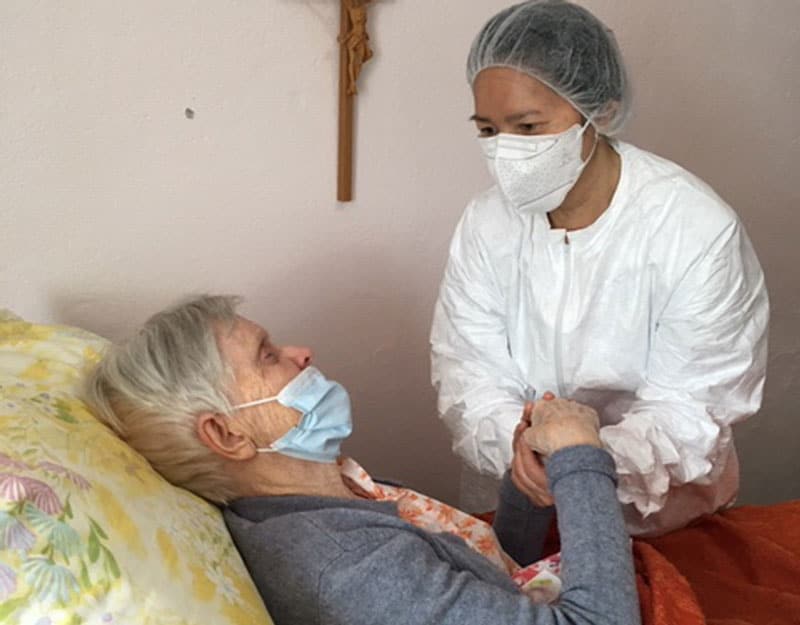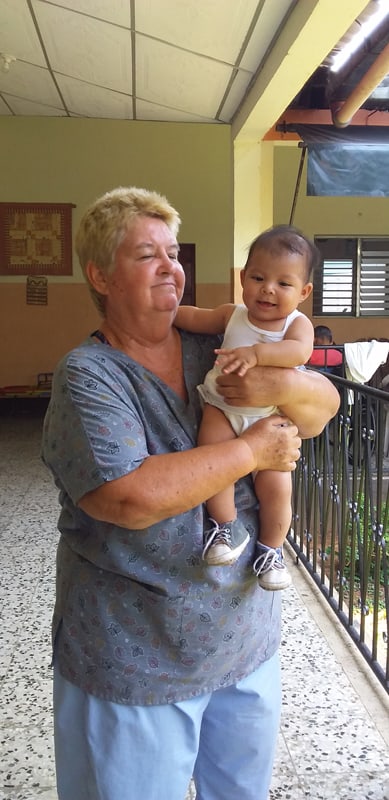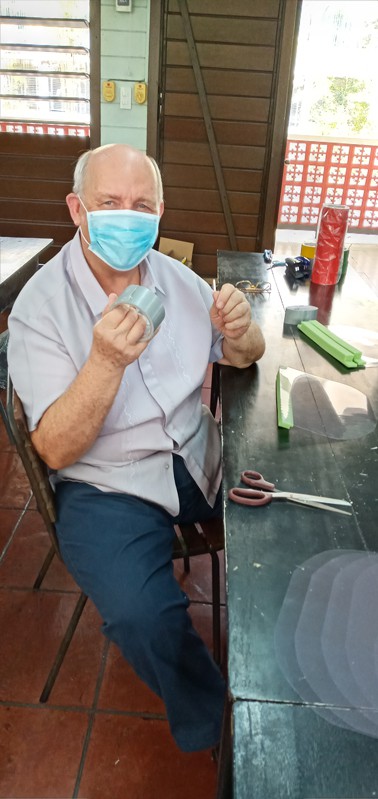Maryknoll missioners in various parts of the world share how they and the people they serve are responding to COVID-19
KENYA
At St. Patrick’s Parish and Dispensary in the informal settlement of Bangladesh, in Mombasa, Kenya, where I work as a Maryknoll lay missioner, we are trying to be proactive in responding to the COVID-19 virus. Our first project was to buy soap since one of the best ways to prevent the spread of the virus is through frequent handwashing.
That is a challenge in informal settlements, where pit latrines are shared by several households. Here in Bangladesh the people do not have running water; they fill their jugs when the water truck arrives. Educating people about the importance of handwashing seemed a good place to start.
For poor people, soap is a luxury. When you barely earn enough to feed your family, it is unlikely you will buy a bar of soap that costs 30 shillings (30 cents). Thanks to donors, we purchased 124 cartons of soap (50 bars each). At the dispensary we give out a bar to everyone who comes in. With every bar, we include education on handwashing. It is an easy way to make a difference.
Kathy Flatoff, MKLM
HAITI
There are no confirmed cases of the coronavirus in the Grand’Anse Department in Jeremie, Haiti, where I serve as a Maryknoll affiliate, but there has hardly been any testing. Haiti’s healthcare system is in no position to deal with COVID-19. The only hope is prevention.
Our non-governmental organization, Haitian Connection, is working with local partners to help people. We have established a group that is sewing masks for the community. We have distributed 100 water buckets with faucets and soap so people can wash their hands. The water buckets have a filter so they also have clean drinking water. In addition, we have distributed 4,000 konparets (a kind of sweet roll or scone) to two parishes and several orphanages to combat hunger. And we pray.
Renate Schneider, Maryknoll Affiliate

During COVID-19 quarantine, Maryknoll Sister Ngoc Hà Pham, a nurse, visits Maryknoll Sister Maureen Corr, a senior sister at the Maryknoll Sisters center in New York. (Courtesy of Ngoc Hà Pham/U.S.)
UNITED STATES
Shortly after I arrived in February for my new mission in South Sudan, where I was teaching nursing students, the first case of COVID-19 was confirmed in Africa. South Sudan began shutting its borders, and we foreigners were advised to leave. Back at Maryknoll, N.Y., I soon learned that schools had closed in South Sudan and all my students had been sent home.
Reluctantly I had left South Sudan because of COVID-19 only to find myself at the epicenter of the pandemic in New York. Our Maryknoll Sisters Center was already in lockdown. The sisters were practicing social distancing and wearing home-sewn cloth masks.
Within days, many of our sisters were exhibiting symptoms of COVID-19. Our nursing staff worked tirelessly to keep the sisters safe. I was asked to help on our nursing home floors since I am a nurse and we were facing a shortage of nurses here. I wanted to be there for the nursing staff and especially for our sisters, who feel the loneliness of enforced isolation. Under all the layers of gowns and masks, the sisters still recognize the connection between us. When they see the Maryknoll Sisters ring on my finger through the gloves, their faces light up and they seem to feel comforted.
COVID-19 has affected all of us. I believe we have a greater appreciation for one another.
Ngoc Hà Pham, M.M.

GUATEMALA
As a Maryknoll sister, I coordinate a 16-bed hospice care facility for adults with HIV in Guatemala. Since March 13, when President Alejandro Giammattei announced the first case of COVID-19 in the country, we began measures to ensure that our residents would remain free from the risk of the coronavirus. The only “outside” person to visit is the attending physician. Staff wear masks and maintain social distancing.
At present all of our residents are stable. Keeping them mentally and emotionally positive is our priority. We have organized walks in the adjacent farm, karaoke sing-alongs and bingo. The residents have unlimited access to a telephone to call family and friends.
Recognizing that people with HIV are among those vulnerable to the coronavirus, we emphasize the importance of taking their medication and having good nutrition. Each staff member takes extra time to talk one-on-one with the residents to encourage them not to lose heart.
Delia Smith, M.M.

PHILIPPINES
Here in Manila, at the Loyola House of Studies in the Jesuit Ateneo University where I teach, we are under strict lockdown. We priests and seminarians are using our time to assemble protective gear to be worn by front-line workers (healthcare workers, security guards, drug-store clerks, etc.) to prevent infection. Working as a team on an assembly line, we finish about 200 pieces every day. We’re happy to do our part to serve others’ needs.
James Kroeger, M.M.
Featured Image: Lay Missioner Kathy Flatoff holds soap to be distributed to residents in the informal settlement of Bangladesh in Kenya to encourage handwashing to prevent COVID-19 infection. (Courtesy of Kathy Flatoff/Kenya)
